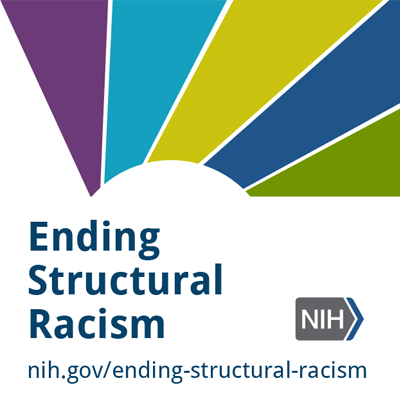Structural Racism and Discrimination

NIMHD Director Statement in Support of NIH Efforts to Address Structural Racism
Structural racism and discrimination (SRD) refers to macro-level conditions (e.g. residential segregation and institutional policies) that limit opportunities, resources, power, and well-being of individuals and populations based on race/ethnicity and other statuses, including but not limited to:
- Gender
- Sexual orientation
- Gender identity
- Disability status
- Social class or socioeconomic status
- Religion
- National origin
- Immigration status
- Limited English proficiency
- Physical characteristics or health conditions
Achieving health equity for all in the U.S. will require dismantling this country’s historical legacy of structural racism.

There is increasing recognition that SRD contributes to poorer health outcomes for racial and ethnic minorities and other populations who experience health disparities. Neighborhood segregation, a widely studied form of structural racism, has been shown to directly influence racial disparities in health outcomes. In addition to SRD’s direct effects on access to opportunities and resources, it affects psychological health. SRD in the forms of societal-level conditions, societal norms, and institutional policies that create and sustain disadvantage are risk factors for poor physical and mental health conditions.
Despite evidence pointing to the data on the detrimental health effects of racism and discrimination, measures of these constructs are not included routinely as social determinants of health (SDOH) in human research. Research that includes racism and discrimination is often limited to studies of one specific form of SRD, such as interpersonal interactions or residential segregation. An important facet of NIMHD's Research Framework is to expand our understanding about the interactions of interpersonal and structural racism and discrimination across multiple levels of influence (individual, interpersonal/organizational, community, societal) and the downstream impact on health and health disparities.
NIMHD is studying and addressing issues related to SRD through a variety of initiatives:
NIMHD Seminars and Workshops on SRD
NIMHD hosts senior research investigators to present on SRD-related topics. Most recently:
- Dr. Ebony Boulware, Eleanor Easley Professor of Medicine, Director, Clinical and Translational Science Institute Associate Vice Chancellor for Translational Research at Duke University School of Medicine, spoke on the topic of democratizing health data to achieve community health equity.
- Dr. Sherman James, Susan B. King Distinguished Professor Emeritus, Sanford School of Public Policy at Duke University, presented for intramural researchers on John Henryism, an active coping style among African American men and its ill effects on health, especially among those of lower socioeconomic status.
Workshop on Structural Racism:
For this 2017 event, NIMHD organized national leaders to explore the issue and consider topics and challenges for future research.
NIMHD Content on SRD
- The need to improve our understanding of how racism and discrimination are conceptualized, measured, and contribute to health disparities.
- How to promote multi-sectoral interventions that address structural drivers of health disparities.
- NIMHD Director Statement in Support of NIH Efforts to Address Structural Racism by Eliseo J. Pérez-Stable, M.D.
- In Search of Equity: Rethinking Race and Racism in Science and Medicine
by L. Ebony Boulware, M.D., M.P.H. - Racism and the Health of Every American by NIMHD Director Eliseo J.
Pérez-Stable, M.D. - Centering Structural Inequities in Conversations on Mental Health Among
People of Color by Margarita Alegría, Ph.D. - Spotlight on COVID-19 and Health Disparities: Opportunities to Achieve Better Understanding and Equality for Vulnerable Populations by NIMHD Director Eliseo J. Pérez-Stable, M.D.
- Addressing Social Needs and Structural Inequities to Reduce Health Disparities: A Call to Action for Asian American and Pacific Islander Heritage Month by Marshall H. Chin, M.D., M.P.H.
NIMHD Funding Resources and Opportunities
Funding Opportunity Announcements
NIMHD supports many Funding Opportunity Announcements that include SRD-related topics as an area of particular interest:
- Understanding and Addressing the Impact of Structural Racism and Discrimination on Minority Health and Health Disparities (R01 Clinical Trial Optional)
- Addressing the Etiology of Health Disparities and Health Advantages Among Immigrant Populations (R01 Clinical trial not allowed)
- Please see our list of Active NIMHD Funding Opportunities for more.
Funded Projects
- Racial/ethnic disproportionality in school disciplinary actions.
- Differential teacher treatment.
- Community-level youth and law enforcement violence prevention interventions.
Research Concepts
- Observational research to understand the role of SRD in causing and sustaining health disparities.
- Research testing interventions that address SRD in order to improve minority health or reduce health disparities.
NIMHD-Supported, NIH-Wide Initiatives
- “The Time is Now” to End Racial Inequities in Medical Research April 12, 2022
- NIMHD Director Statement in Support of NIH Efforts to Address Structural Racism March 2, 2021
Other NIH-Related Resources
The National Institute of General Medical Sciences is supporting an FOA Notice of Special Interest entitled “Understanding and Addressing the Impact of Structural Racism and Discrimination on Biomedical Career Progression and the Biomedical Research Enterprise.”
Page updated February 23, 2023

















